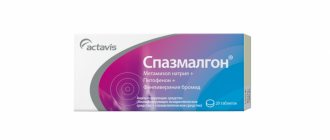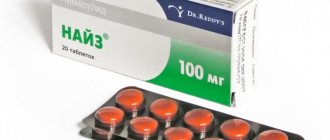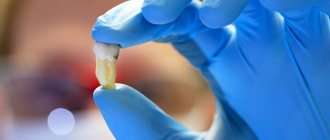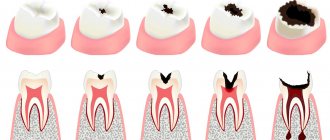March 21, 2019
In our age, when dental treatment is completely painless, many people still delay until the last minute and are in no hurry to see dentists, preferring to drown out the discomfort and pain with the help of medications. So, often, due to its fairly good effectiveness and over-the-counter availability from pharmacies, some people prefer to buy Baralgin, which saves them from toothache. And the editors of the UltraSmile.ru portal, as always, stand guard over your health and offer material for reading that will help you take into account all the possible “secrets,” disadvantages and advantages of this drug, as well as a sober approach to its choice.
"Baralgin" and its structural analogues are banned in many countries around the world
"Baralgin" is a non-narcotic drug belonging to the group of pyrazolones. It really helps with toothache and many other types of pain. It also allows you to temporarily get rid of spasmodic pain and reduces fever, because... is an antispasmodic and antipyretic (translated from Latin antipyretic means “against heat”). The desired effect can be achieved through the presence of a component such as metamizole sodium or a more well-known substance in Russia called “analgin” (synonyms: dipirone, ronalgin). Some analogues also contain pitofenone hydrochloride and fenpiverinium bromide, which enhance the positive and negative effects of metamizole. Analgin or dipyrone itself was first discovered back in 1922 by representatives of the German company Hoechst.
Baralgin really helps with toothache
In Russia, Belarus and Tajikistan, “Baralgin” itself, “Baralgin M” and any double drugs or combination drugs that contain analgin are very popular (“Spazgan”, “Spazmalgin” and “Spazmalgon”, “Maxigan”, “ Metamizole sodium", "Tempalgin", "Pentalgin" and others). However, in Europe, America, Japan, Greece, Mexico (more than 44% of such drugs), Saudi Arabia, and the Philippines, drugs of the pyrazolone group are prohibited. Despite the fact that pharmaceutical companies and pharmacies at one time suffered large material losses associated with such a restriction.
What were the reasons for such bans? Researchers have found that drugs of this group, when used uncontrolled and over-the-counter, increase the risk of bone marrow damage by 24 times, contribute to severe failure of the immune system, the appearance of blood diseases (negatively affects leukocytes, destroying white blood cells) and acute allergic reactions, as well as other toxic effects leading to death. In different countries, studies confirming this fact were carried out in different years:
- in 1973, scientists from the United States sounded the alarm: in 1977, drugs based on dipirone (analgin) were withdrawn from the market. In 1978, it was found that more than 7,000 people worldwide suffer from it every year1 (i.e., people experience severe agranulocytosis and, as a result, death),
- In 1986, doctors from Germany conducted their research and found that after taking the drugs, death occurred in 94 cases (of which 39 cases were due to anaphylactic shock2): by 1990, dipyrone drugs completely disappeared from the market.
Studies in many countries have revealed negative consequences of taking the drug.
Further, similar studies were carried out in other countries, and dipirone, and especially combination drugs based on it, were banned in Canada, Italy, Austria, and so on. If you can find them there, then only strictly according to the recipe. However, in Russia, drugs based on it are successfully sold without a prescription and are still used today (according to some data, up to 500 tons of drugs based on analgin are produced per year). "Baralgin" is no exception. In addition, its price seems quite reasonable to many and is approximately 250 rubles for a package of twenty tablets (and the shelf life is good - 4 years).
Features of application
In its pure form, analgin (metamizole sodium) has a negative effect on the blood and irritates the gastric mucosa. Although about 100 years ago it was praised as a panacea. The destructive properties of the effective substance were not immediately identified. Metamizole sodium in some cases can lead to anaphylactic shock - a side effect that is life-threatening for the patient. The most terrible consequence is agranclocytosis, which is always fatal (the number of important granulocytes in the blood, which help the immune system fight various infectious diseases, decreases).
It is no coincidence that more than 40 countries around the world have removed Analgin from pharmacy display cases. But, being a component of the balanced composition of Baralgin, it will not cause harm to the gastrointestinal tract - the patient can safely take these tablets for aching toothache. They are sold in pharmacies without a prescription, although the drug is not as harmless as it seems.
Baralgin tablets are more preferred than ampoules, since intramuscular injections are very painful.
When administering Baralgin intramuscularly, the ampoule should be heated to 37 degrees
Discomfort can be slightly reduced if the ampoule is warmed to human body temperature before administering the medicine. Injecting the drug into a vein is practiced only in special, emergency situations.
Attention! Uncontrolled use of Baralgin is dangerous! To relieve acute tooth pain, it can be taken for no more than 5 days. During this time, you need to organize a visit to the dentist and begin to deal with the problem therapeutically or surgically.
The maximum single dose of the drug is 1000 mg (2 tablets). You are allowed to take no more than 6 tablets per day (whole, without crushing or chewing), washing them down with plenty of water.
According to patient reviews, there is another method of treatment with Baralgin: the tablet is not taken orally, but is placed on the suffering tooth and closed with the jaws. In the case of a deep carious hole, the tablet is crushed and a piece is placed into the cavity. Many note the increased effectiveness of this treatment. However, experts have a different opinion: Baralgin’s medicinal formula has a destructive effect on tooth tissue and can aggravate the disease.
The medicine effectively relieves moderate pain
"Baralgin" is quite effective against toothache, which is of medium and low intensity. For example, it will help cope with the pain of caries, help survive the post-surgical stage of tooth extraction, implantation, osteoplastic surgery or vestibuloplasty.
The drug is quickly absorbed into the blood and helps reduce discomfort after 20 minutes. It is valid for the next four hours. However, you can use it no more than 3-5 days in a row, and certainly not on an ongoing basis. Therefore, if you are worried about toothache, then the most reasonable thing to do would be to take a one-time tablet and make an appointment with a dentist as soon as possible, who will provide symptomatic treatment. You can take a dose not exceeding 6 tablets per day (one tablet contains 500 milligrams of metamizole sodium, i.e. analgin or dipyrone). If there is no effect or you are in no hurry to treat your teeth, then stop taking Baralgin, because it can seriously harm your health.
The drug helps cope with moderate and mild pain
Description of the drug
Baralgin is a strong analgesic and antispasmodic.
It effectively reduces body temperature, stopping the process of inflammation, soothing painful symptoms. Baralgin goes on sale in the form of tablets and ampoules for injection. The pharmaceutical composition of the drug has a complex effect on the body, suppressing the manifestations of the disease and increasing a person’s pain threshold.
The drug formula includes the following ingredients:
- Analgin (metamizole sodium) is a non-steroidal drug, an analgesic from the pyrazolone group
- Pitophenone hydrochloride – containing 3 components with anti-inflammatory, antipyretic, myotropic and analgesic effects
- Phenpiverinium bromide is a combined substance with the same effect as the previous ingredient
Anesthetic components accumulate in the blood and, reaching the required concentration, effectively suppress the sensitivity of receptors, the functions of which are responsible for the conduction of nerve impulses (pain signals) to the brain.
Unlike pure analgin, the analgesic effect of baralgin occurs faster and lasts longer
The effect of analgin is significantly enhanced by the remaining components of the medicinal formula, so the analgesic effect is very pronounced. Within 20-25 minutes the patient has the required concentration of active components in the blood and feels their effect, which lasts up to 4 hours.
Attention! Baralgin cannot relieve acute, debilitating toothache. The instructions contain a list of conditions that can be affected by the drug. All of them involve moderate pain.
Therefore, with aching pain, inflammation of the gums and increased sensitivity of the teeth, Baralgin will be able to provide effective assistance to the patient. But if a person is suffering from deep caries, pulpitis or gumboil, the drug will only alleviate the condition, but will not completely relieve the acute pain.
Tablets can cause stomach pathologies
The instructions for Baralgin say what it helps with. The sphere of its influence is not only toothache, but also pain of various origins, including stomach pain and intestinal colic. However, the drug will cause additional problems if you use it incorrectly. It will cause damage to the gastrointestinal tract, affect the mucous membrane, and lead to peptic ulcers.
So, to eliminate such problems, let's consider a few rules on how to take medicine:
- take the tablets only with meals or immediately after meals,
- take the tablets with plenty of liquid,
- Do not chew the tablets, because They are very bitter and in some people with sensitive mucous membranes, their taste can even cause a gag reflex.
When taking the medicine, the urine may turn red, as stated in the instructions for the drug. You shouldn’t be afraid of this phenomenon, because... it has no clinical significance and disappears without a trace after stopping the pills.
The tablet must be taken with plenty of water.
Do not take the drug with other analgesics
Have you taken Baralgin, but your toothache still won’t go away? In this case, some people try to increase the effect of the medicine and believe that if they take another analgesic, they will be able to avoid complications. However, this opinion is erroneous; the instructions for the drug indicate that with such a combination the toxic effect of the drug, and in particular the toxicity of analgin, can increase significantly. Also take into account the fact that the tablets also enhance the toxic effect of alcohol, which can result in severe liver damage, so exclude the possibility of taking these two components at the same time.
You should take Baralgin with great caution, which helps with toothache in the presence of low blood pressure (sharply lowers blood pressure), with sensitivity and intolerance to analgin (there is a high probability of Quincke's edema and anaphylactic shock). The tablets should not be taken by pregnant women, children under 15 years of age, people with glaucoma, or nursing women (if you take the medication, you will be able to return to feeding your baby with breast milk no earlier than 48 hours later).
Contraindications
Baralgin has a number of serious contraindications, which are important to heed. The drug is especially dangerous during pregnancy at any stage. Even shortly before giving birth, a woman should not prescribe analgesics on her own without the advice of a gynecologist.
Baralgin is also contraindicated:
- Children and teenagers under 15 years old
- Persons with intestinal obstruction
- For liver and kidney diseases
- For problems with hematopoiesis
- For diseases of the heart and blood vessels
- People with glaucoma
- If you have asthma or any bronchial ailments
- In case of individual intolerance to any of the components of the drug, as well as alcohol intolerance
- During breastfeeding
Attention! Different medications often cannot be harmoniously combined in their effects on the body, leading to serious consequences. Therefore, when saving from severe toothache with Baralgin while using other medications, a person is at risk of intoxication of the body. Any combination of drugs should be discussed with your doctor.
Simultaneous use of Baralgin and alcohol is harmful to the human liver
Baralgin is not compatible with alcohol. When taken simultaneously, alcohol and medicine will act with double force, which will poison the body and fill the liver with dangerous toxins. Baralgin slows down the breakdown of alcohol and increases its toxicity. And the pain in the tooth, which the person planned to get rid of with the help of a lethal combination of medicine and alcohol, will become many times stronger. And the patient’s general condition will deteriorate significantly.
The medicine is dangerous for children
As we have already found out, tablets are prohibited for children under 15 years of age due to their toxicity, even in single dosages. But narcologists in some areas are sounding the alarm. Thus, in Kyrgyzstan (Kerben), narcologists notice that local youth actively use the painkiller "Baralgin", deliberately causing themselves to be in a cheerful state, because. the medication causes sensations similar to mild intoxication. Of course, for such a condition to occur, you need to eat almost a handful of tablets, but doctors urge parents to be vigilant, because with 10-20 tablets, intoxication of the body is already achieved. And it would be fine if the side effects for children ended only with the appearance of addiction, mental and deviant deviations. But for a child’s body, such a load can end much worse, causing a stroke.
For children with this problem, it is better to choose another drug
It is interesting that regarding contraindications in children, there is quite contradictory information in the advertising of the drug “Baralgin”. For example, tablets cannot be used until the age of 15, but injections (the second form of the drug) can be given after reaching 6 years. However, many experts, in principle, suggest considering the drug as the very last resort not only for children, but also for adults, regardless of the type of pain that occurs.
Finally, we will give you a statement from specialists who are members of the medication commission of the German Medical Association. They argue that analgin-based drugs like Baralgin should be used only in truly severe and life-threatening conditions, for example, after surgery. And the same headache or toothache, intestinal colic are not mortally dangerous if a person seeks to eliminate not only the symptom, but the root cause of their appearance, i.e. undergoing treatment. The editors of the portal UltraSmile.ru agree with this sensible argument, therefore, before taking any medicine, we advise you to think about it and first evaluate the possible benefits and harms. You should also refrain from systematically using any medications without consulting a doctor.
Notice
: Undefined variable: post_id in
/home/c/ch75405/public_html/wp-content/themes/UltraSmile/single-item.php
on line
45 Notice
: Undefined variable: full in
/home/c/ch75405/public_html/wp-content /themes/UltraSmile/single-item.php
on line
46
Rate this article:
( 2 ratings, average: 4.00 out of 5)
toothache
- Dukes, 1987, op cit, p9126
- BUKO Pharma Kampagne, Hoechst, A Cause of Illness? The Pharmabusiness in the Third World, Germany, May 1986, p19.
Analogs and replacement methods
Drugs similar to Baralgin are divided into 2 types:
- Similar in composition (Optalgin, Analgin, Spazdolzin, Sodium Metamizole);
- Having the same therapeutic effect (these drugs are not used to treat toothache).
Spazdolzin analogue of Baralgin for children
Spazdolzin is a drug similar in composition to Baralgin, which is available for children from 2 to 5 years old in the form of rectal suppositories, and for older children and adolescents - in the form of tablets. Although in some cases it is permissible to give tablets to children in a minimal dose.
Suppositories are used in the form of 1 dose according to the following scheme:
- 0-1 years – 100 mg
- 1-3 years – 200 mg
- 3-7 years – 400 mg
- 7-14 years – 600 mg
No more than 4 suppositories are allowed per day. Before inserting the suppository, the child should take a horizontal position.
Tablets are given to the child according to the following instructions:
- 2-3 years – 50-100 mg
- 4-5 years – 150 mg
- 6-7 years – 200 mg
- 8-10 years – 250 mg
- 10-14 years – 300 mg
A child should take no more than 3 tablets per day!
In addition to Spazdolzin, there is an effective children's drug - Kamistal baby gel, which is often used even by adults to relieve toothache.
The gel contains lidocaine, which freezes the inflamed areas, and, thanks to this, the pain subsides. The drug can be used during the period of growth and replacement of teeth in children. Gel analogues: Metrogyl Denta and Dentol.
Baralgin is contraindicated for pregnant women
Pregnant women can risk replacing Baralgin only with the No-shpa tablet, which is relatively harmless. Or rinse your mouth with herbal tinctures. As a rule, every woman should approach pregnancy planning wisely and cure all her teeth before the fetus settles inside, which needs to be cherished and protected.
Comments
I am terribly afraid of dentists, so for a long time I took Baralgin on a regular basis for toothache, because... helped a lot. I read your article and was really scared of the consequences. How to get rid of your fears and doubts and still decide to go to the doctor?
Alesya (03/23/2019 at 10:03 am) Reply to comment
- Dear Alesya! Realize the fact that today dental treatment is completely painless with the help of the latest and safe anesthetics, and to delay means causing inevitable harm to the entire body as a whole. And to cope with your fears, be sure to read our article on the topic “5 tips on how to stop being afraid of dentists.”
Editorial staff of the portal UltraSmile.ru (03/26/2019 at 09:37) Reply to comment
I read in an article that baralgin causes agranulocytosis. What is this and what are its symptoms?
Valeeva_N (04/03/2019 at 12:56 pm) Reply to comment
- Agranulocytosis is a dangerous pathological disease that suppresses the production of white blood cells (sharply reduces the level of leukocytes in the blood) and affects their function, as a result of which a person’s immune status is impaired, the process of hematopoiesis, and the susceptibility to any infectious or viral disease or bacterial infections increases sharply . In 80% of all cases, the pathology is characterized by death. Main symptoms: shortness of breath, fear of light, rapid heartbeat, sweating, the appearance of ulcers on the body mucosa, fever, general weakness and fatigue.
Editorial staff of the portal UltraSmile.ru (03/06/2019 at 09:16) Reply to comment











